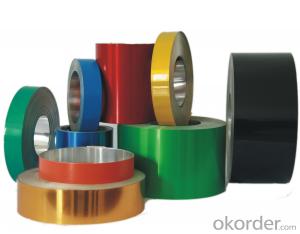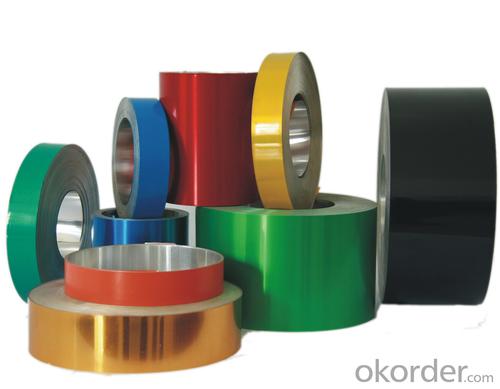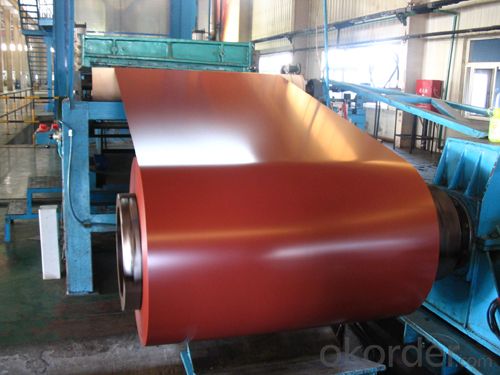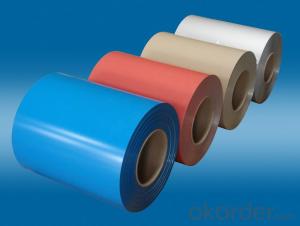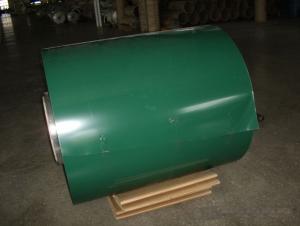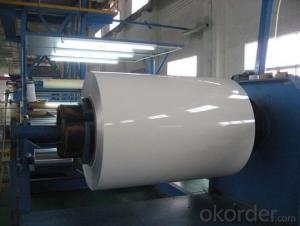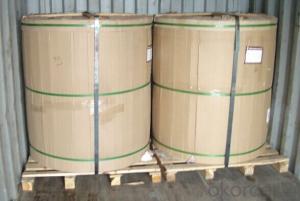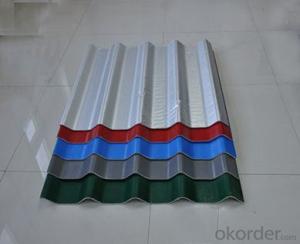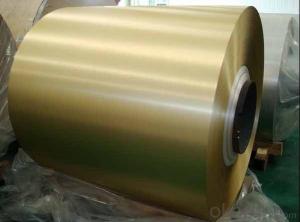Aluminum Roofing Sheet Coils - Coated Aluminium Coil/Roll for Aluminium Roller Shutter
- Loading Port:
- Tianjin
- Payment Terms:
- TT OR LC
- Min Order Qty:
- 2 m.t.
- Supply Capability:
- 50000 m.t./month
OKorder Service Pledge
OKorder Financial Service
You Might Also Like
Specification
Coated Aluminium Coil/Roll For Aluminium Roller Shutter
Description
Alloy | 1060, 1100, 3003, 8011, etc. |
Temper | H16, H18, H24, H26, H28 |
Thickness | From 0.05mm to 3.0mm |
Width | Standard width:1240mm |
Special width:1300mm, 1520mm, 1570mm, 1595mm | |
Diameter | Standard dia:1200mm |
Interior dia:150mm,405mm,505mm | |
Weight | 2.5 T/coil,3.0 T/coil |
Coating | PE, PVDF, ACRYLIC |
Surface | Embossed, mill finish, coated |
Color | AS to code RAL |
Gloss | 10-90%(EN ISO-2813:1994) |
Coating Thickness | PE: more than 18 micron |
PVDF: more than 25 micron | |
Coating Hardness(pencil resistance) | More than 2h |
Coating adhesion | 5J (EN ISO-2409:1994) |
Impact Resistance | No peeling or cracking(50 kg/cm,ASTMD-2794:1993) |
Flexibility(T-bend) | 2T |
MEK resistance | More than 100 |
Advantage | 1.High temperature resistant 2.Weathering resistant 3.Scrubbing resistant 5.Acid or alkali proof 6. Fireproof 7.Light weight material is easy to construct and install |
Out package | Wooden splint with export standard |
Application | ACP, wall cladding, facades, roofs and canopies, ceilings, signboards, blind window, display platforms, electrical panels, etc |
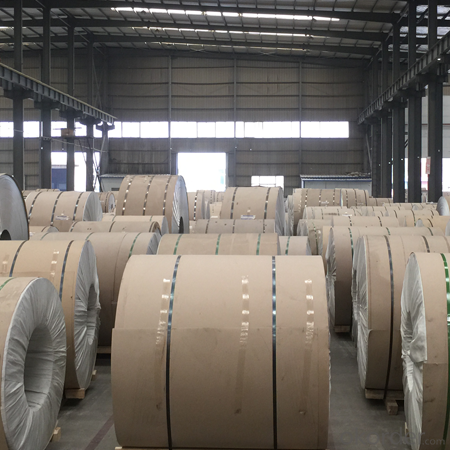
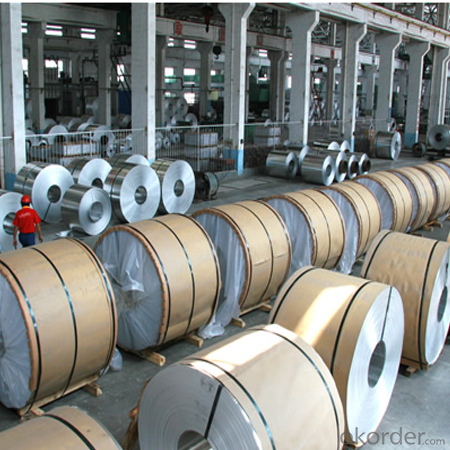
Manufacturing
Decoiler → Accumulator →Tension Leveler →Acid & Alkali Cleaner → Rinse →Conversion Treatment → Priming coater →Infrared Curing Oven →Main coater →Floatation Curing Oven →Strippable Film Applicator → Exit Accumulator → Recoiler
FAQ
--Q: Do you provide free samples?
--A: Yes, free samples will be sent to you on freight at destination.
--Q: Can I get your latest products catalogue?
--A: Yes, it will be sent to you in no time.
--Q: What is the MOQ?
--A: 2 tons
--Q: What are your payment terms?
--A: We accept L/C, T/T.
--Q: What kinds of alloy can you supply?
--A: 1000 series: 1050, 1060, 1070, 1100, 1145, 1200
3000 series: 3003, 3004, 3105, 3104
5000 series: 5052, 5083, 5754, 5182
6000 series: 6061, 6063, 6062, 6063
8000 series: 8011, 8021
--Q: What kinds of temper can you supply?
--A: O-H112: O,H12,H14,H16,H18,H22,H24,H26,H,32,H34,H111,H112
T3, T4, T6
- Q: What substances are used to make aluminum coils?
- <p>Aluminum coils are made from aluminum, a lightweight and malleable metal with the chemical symbol Al. They are typically produced from high-purity aluminum or aluminum alloys, which may include small amounts of other elements to enhance specific properties such as strength, durability, or resistance to corrosion. Pure aluminum is soft and lacks strength, so alloys are often used to improve these characteristics for various applications.</p>
- Q: I take an extracurricular aircraft class, and I got the okay to take some old painted sheet aluminum for another project I'm working on. The problem is, what I'm using it for I need bare aluminum. I heard around that air crafts are painted with something that regular (store-bought) paint stripper can't remove. Is this true? I am aware of the fact that stripping something like that will result in a toxic paint sludge, so I've taken precautions for that. I just need to know if heavy-duty paint stripper from Home Depot will do the job. Thanks :)
- Go to an automotive paint store like Sherwin Williams Auto Paints, buy a stripper for the type of paint on the aluminum. Many are epoxy or special acrylics like acry glo or jet glo paints and home paint strippers usually won't phase those paints. A methylene chloride mixed with a soap or wax carrier will work but is a hazmat item and has to be disposed of properly but it won't be corrosive to the aluminum. Dupont, Sherwin Williams, and others make the proper strippers. You might even find some at an RV or Boat supply.
- Q: How do aluminum coils contribute to sustainable packaging?
- Sustainable packaging practices are greatly influenced by aluminum coils. Firstly, aluminum possesses the unique quality of being infinitely recyclable, meaning it can undergo recycling processes repeatedly without compromising its properties or quality. This aspect significantly enhances the sustainability of packaging as it reduces the necessity of extracting and processing new materials, thereby conserving natural resources and minimizing the environmental impact associated with mining and production. Furthermore, aluminum coils boast exceptional barrier properties, effectively safeguarding packaged goods from external elements including moisture, light, and oxygen. This barrier function plays a crucial role in prolonging the shelf life of products, thereby reducing food waste and eliminating the need for additional packaging or preservatives. By maintaining the freshness of products for extended periods, aluminum coils contribute to sustainable packaging efforts by combating food loss and promoting resource efficiency. Moreover, aluminum's lightweight nature makes it an ideal material for packaging. Its low weight allows for reduced transportation costs and energy consumption during shipping, ultimately leading to a decrease in overall carbon emissions. Additionally, the lightweight characteristic of aluminum coils makes them convenient for end consumers, thereby minimizing the environmental impact associated with disposal and recycling. Additionally, aluminum demonstrates high durability and resistance to corrosion, ensuring the integrity of packaging throughout its lifecycle. This durability allows for the reuse or repurposing of aluminum coils, further reducing waste and extending the material's lifespan. In conclusion, the utilization of aluminum coils in packaging promotes sustainability in various ways. It contributes to a circular economy by being infinitely recyclable, reduces food waste through effective barrier properties, lowers carbon emissions through lightweight design, and encourages reuse and repurposing due to its durability. By incorporating aluminum coils into packaging solutions, significant strides can be made towards achieving a more sustainable and environmentally friendly packaging industry.
- Q: Are aluminum coils easy to install?
- Yes, aluminum coils are generally easy to install. They are lightweight and flexible, which makes them easier to handle and maneuver during installation. They can be easily cut and shaped to fit the specific requirements of the installation, and they are often available in pre-cut sizes, further simplifying the installation process. Additionally, aluminum coils are typically designed with features such as interlocking edges or snap-on connectors, which make it easier to join multiple coils together or connect them to other components. Overall, with the right tools and basic knowledge of HVAC installation, aluminum coils can be installed relatively easily.
- Q: Are aluminum coils suitable for coil coating applications?
- Indeed, coil coating applications find aluminum coils to be a suitable option. Aluminum, owing to its outstanding resistance to corrosion, lightweight composition, and impressive strength-to-weight ratio, enjoys extensive usage in coil coating. Moreover, its high malleability facilitates effortless shaping and molding throughout the coil coating procedure. Furthermore, aluminum coils can be coated with an array of paints and coatings, offering a diverse selection of colors and finishes. To sum up, aluminum coils are a favored preference for coil coating applications due to their adaptability, longevity, and visually pleasing attributes.
- Q: How do aluminum coils compare to fiberglass coils in terms of weight?
- Aluminum coils are generally lighter in weight compared to fiberglass coils. Aluminum is known for its lightweight properties, making it an ideal choice for various applications, including coil manufacturing. Fiberglass, on the other hand, tends to be denser and heavier than aluminum. This weight difference can have several advantages when it comes to installation and transportation. Lighter aluminum coils are easier to handle, require less effort to install, and can be more cost-effective in terms of shipping and logistics. Additionally, the reduced weight of aluminum coils can contribute to overall energy efficiency in HVAC systems, as it requires less power to move and circulate air through the coils. However, it's worth noting that the weight comparison between aluminum and fiberglass coils may vary depending on the specific design and thickness of the materials used.
- Q: This question asks for guidelines on safely transporting aluminum coils, which are large and heavy metal rolls used in various industries.
- <p>To transport aluminum coils safely, follow these steps: Use specialized vehicles with proper securing mechanisms to handle the weight and prevent rolling. Ensure the coils are balanced and secured with straps or chains to avoid shifting during transit. Maintain a steady speed to minimize vibrations that could cause damage. Avoid sudden stops or sharp turns. Keep the load covered to protect from moisture and dirt. Adhere to all legal weight and dimension limits for your route. Regularly inspect the vehicle and load for any signs of damage or instability. Always follow local transportation regulations and safety guidelines.</p>
- Q: What are the maintenance requirements for aluminum coils?
- To ensure optimal performance and longevity, aluminum coils require regular cleaning and inspection. It is recommended to clean the coils at least once a year, or more frequently in areas with high pollution or corrosive environments. Use a mild detergent or coil cleaner along with a soft brush or cloth to remove any accumulated dirt, dust, or debris from the coils' surface. Regular inspection is also crucial to identify any signs of damage, corrosion, or leakage. Bent fins, dents, or corrosion should be promptly addressed to prevent further harm and maintain coil efficiency. If there are any indications of leakage, it is essential to have a professional technician inspect and repair the coils to prevent potential refrigerant leaks. Additionally, it is advisable to keep the area around the coils clean and free from obstructions that may hinder airflow, such as leaves, plants, or debris. This will ensure proper airflow and prevent the coils from overworking, which can result in inefficiency and possible damage. In conclusion, maintaining aluminum coils involves regular cleaning, inspection for damage, corrosion, or leakage, and keeping the surrounding area clear for optimal performance and longevity. By following these maintenance practices, you can ensure the efficient functioning of the aluminum coils and extend their lifespan.
- Q: Can aluminum coils be used in signage applications?
- Yes, aluminum coils can be used in signage applications. Aluminum is a popular material for signage due to its durability, lightweight nature, and resistance to corrosion. It can be easily formed into various shapes and sizes, making it suitable for different types of signage, including billboards, nameplates, and outdoor signs. Additionally, aluminum can be painted or laminated to achieve different visual effects and enhance the overall appearance of the signage.
- Q: Can aluminum coils be used in the production of heat sinks?
- Indeed, the utilization of aluminum coils is applicable in the manufacturing process of heat sinks. Aluminum, owing to its remarkable thermal conductivity and affordability, enjoys widespread usage as a material for heat sinks. These heat sinks are efficiently employed in the dissipation of heat emanated from electronic components like processors, power transistors, and LED lights. The coils can be fabricated into diverse forms and dimensions to fulfill particular heat dissipation prerequisites. Furthermore, aluminum possesses the advantages of being lightweight, resistant to corrosion, and readily accessible, rendering it an optimal selection for the production of heat sinks.
Send your message to us
Aluminum Roofing Sheet Coils - Coated Aluminium Coil/Roll for Aluminium Roller Shutter
- Loading Port:
- Tianjin
- Payment Terms:
- TT OR LC
- Min Order Qty:
- 2 m.t.
- Supply Capability:
- 50000 m.t./month
OKorder Service Pledge
OKorder Financial Service
Similar products
Hot products
Hot Searches
Related keywords
